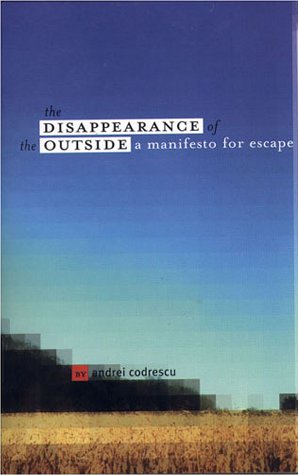The Outside: beyond wall and watchtower, on the far lee of the border, the place of the Other, the place of exile. Now that the walls are crumbling around the world, helped along by the crowbars of angry patriots; now that the faces of the other look pretty much like our own, the Outside seems to be shrinking. In its place we have some dawning version of the Global Village, whereby a denizen of Zamboanga wears the same sneakers and listens to the same pop music as a Manhattan sophisticate, and one nation blends imperceptibly into another.
All this worries Andrei Codrescu, the Romanian exile, poet, and radio commentator who since 1966 has lived in the United States, exercising his surrealist magic. Like his fellow exiles Joseph Conrad and Vladimir Nabokov, Codrescu has made the English language his home, and he has written 26 noteworthy books of poetry, fiction, and fact that outstrip most native production. His latest, The Disappearance of the Outside, announces his emergent technophobia and his fond hope that the world will retain at least some places to escape the machine; in the age of the computer and the networked planet in which the Global Village has devolved into World Empire, Codrescu frets with just cause that “we may become mere images, trapped like shadows in some collective hell. . . . In another generation, people raised by images will not be able to imagine escape. The walls of Plato’s prison-cave will be animated.”
Much of Codrescu’s book-length essay concerns his return to Romania after the fall of Nicolae Ceausescu in December of 1989. Arriving in his hometown of Sibiu, Transylvania, Codrescu notes with some surprise that images have replaced words in bibliocentric Eastern Europe, that television programs and not books temper the intellectual climate of the land where, as a boy, he prowled through bookstores and private libraries, even hanging out in the Russian-language Communist Party bookstore to take advantage of the air-conditioning. And what shows are beamed into Romanian homes, haunted by Ceausescu and Dracula? Dallas, Dynasty, and Miami Vice, the stuff of brain death in many an unsuspecting land.
Invisible in the way of a practiced exile, Codrescu affords a moving account of life in revolutionary Romania, democratic for the moment but still aswarm with Stalinists, unrepentant agents of the Securitate, and other enemies of liberty. But this account is secondary to Codrescu’s larger meditation, centering not only on The Disappearance of the Outside but on the subtle erasure of cultural differences in the age of worldwide television and computer data networks. (While there is much merit to Codrescu’s argument, at the same time, ethnic hatred seems to be on the rise everywhere as borders of all kinds dissolve—witness Azerbaijan and Bensonhurst.) Like many other theorists of the Information Age, Codrescu speculates upon the possibilities for global electronic control, of a technototalitarianism serviced by a deliberately uneducated, politically apathetic, and terrorized population, uncomprehending helots whose days are spent in equal parts at the workplace and before the television set. (All those to whom this sounds familiar may now shudder.)
“We are a new kind of being now,” writes Codrescu. “We don’t need an unconscious, we are unconscious.” Overwhelmed by information and inured to all the high-level lying language is used to accomplish, most citizens of the world now shun the written word whenever possible. To lure them back to literacy, “we should wage a campaign against too much information,” the poet writes, “like the campaign against cholesterol. Down with info-fat!”
There may be hidden virtues for bibliophiles like Codrescu in the electronic world. In it, the book may regain some of its status as a sacred object, precisely because it lies on the periphery of the general culture. History has accustomed us to changing fortunes, and the book age is, after all, very young; Johann Gutenberg’s first printed book dates to 1436, and it has been a mere five hundred years since Erasmus of Rotterdam leaped from his carriage, squatted in a muddy lane, and inspected a scrap of newsprint, so thrilled was he to encounter the printed word. There may yet be a future for the written word; on the other hand, the age of the book may be over before it reaches its 600th birthday.
What is to be done? Codrescu issues what he calls “a manifesto for escape,” directed in large measure at his fellow writers. He calls for a renewed reverence for language and for telling the truth with it; he calls for public discourse and an end to the present condition wherein, as he puts it, “most writing today appears headed for the resume, its final resting place.” He urges us to take the example of other exiles, who went Outside rather than submit to the tyranny of their homelands: Aleksandr Solzhenitsyn, Czeslaw Milosz, Guillermo Cabrera Infante, Milan Kundera. He demands a repudiation of worldwide culture, a return to a planet on which Times Square is markedly different from Piccadilly Circus and the Cinza in every particular. And he sets a high subversive goal for his peers: “The poet’s job,” he announces, “is to short-circuit the imaginary globe.”
Codrescu’s manifesto is stimulating and, like all his books, impeccably well-written. It brims with the writer’s hallmark aphorisms, his witty one-liners to trap the unwary: “Modern Russia is an homage to Henry Ford, not to Karl Marx.” The Disappearance of the Outside is a reader’s delight as well, a long evening’s entertainment, a book that provokes nods of assent, provides plenty of room for argument, and raises as many questions as it attempts to answer. Switch off the set and have a look.
[The Disappearance of the Outside, by Andrei Codrescu (Reading, MA: Addison Wesley) 216 pp., $17.95]

Leave a Reply